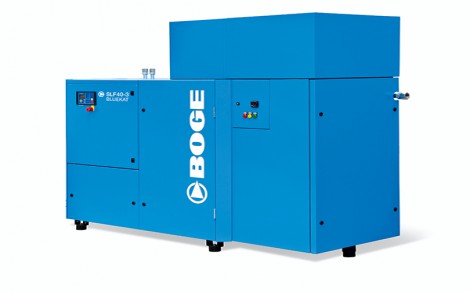Boge website for oil-free solutions

Boge, manufacturer of highperformance compressors, has launched a new website to support manufacturers looking for more economical oil-free Class 0 compressed air solutions. The website, http://oilfree.co.uk, is in response to feedback across several sectors including food and beverage, pharmaceutical and chemical that depend on 100% oil-free compressed air.
For these businesses even the slightest trace of oil could have a serious impact on their products and consequently, the health and safety of end users. Up until now, either oil-free screw compressors or expensive filtration devices have been used, and the results have often been low efficiencies and high costs. Boge’s website showcases alternative solutions by sector, with a host of useful information including whitepapers, user case-studies and topics such as super-deduction and industry myths.
Preconceived notion
Mark Whitmore, general manager of Boge UK, says: “There’s a longstanding preconceived notion that manufacturers can only achieve oil-free air with oilfree screw compressors. With over 100 years’ experience developing compressor technology, we want to show customers they can have peace of mind, greater efficiency and at a muchreduced cost. The new website is a platform to show businesses all the information available to them for oilfree air. Ultimately, it’s not about the compressor, it’s about the quality of the air produced.”
Oil-free compressed air is indispensable in the pharmaceutical, chemical, semiconductor and food sectors as well as in the medical industry. However, the most common solutions currently used have significant disadvantages. Boge comments that oil-free screw compressors can result in a significantly higher compression temperature, a correspondingly lower efficiency and higher leakage losses. Further, multi-stage filtration of the compressed air from traditional compressors can result in additional energy and maintenance costs and don’t guarantee 100% safety.
Boge’s Bluekat converter, showcased on http://oil-free.co.uk, is a catalytic device that is integrated directly after the compression stage serving to oxidise the oil contained in the compressed air into carbon dioxide and water. The purified air has no residual oil and is also bacteria free.
Efficient and economical
Boge comments that compared with other more conventional options, the Bluekat converter is more efficient and economical while eliminating expensive condensate disposal at the same time. In comparison with downstream compressed air treatment, Boge states that it requires less maintenance and offers greater peace of mind.
Whitmore, concludes: “We’re delighted to launch this website which is a solid platform to offer informative and helpful advice. However, the bigger message is that there is a better alternative than oil-free screw compressors and filtration devices for achieving oil-free Class 0 air for critical manufacturing and medical processes."
https://www.linkedin.com/company/boge-compressors/
-
PPMA 2025
23 September, 2025, 9:30 - 25 September, 2025, 16:00
NEC, Birmingham UK -
Advanced Engineering Show 2025
29 October, 2025, 9:00 - 30 October, 2025, 16:00
NEC, Birmingham UK










